Taxation Law: Analysis of Gig Economy Tax Compliance in Australia
VerifiedAdded on 2023/03/17
|8
|2452
|34
Report
AI Summary
This report delves into the taxation laws governing the gig economy in Australia, analyzing the compliance of shared economy providers with income tax regulations. The study highlights the substantial revenue generated by the gig economy but also addresses concerns regarding tax avoidance and non-compliance among workers, often due to ignorance or willful deviation. The report examines the Australian Taxation Office (ATO)'s efforts to improve compliance, including the implementation of reporting schemes for platforms like Uber and Airbnb, mandating the disclosure of worker income details. It further assesses the recommended tax regime, advocating for transaction reporting and considering the challenges faced by low-income earners in this sector. Recommendations include enhancing data matching, providing tax obligation guidance, and promoting educational campaigns. The report concludes by emphasizing the importance of compliance, the role of specialized agencies for confidential reporting, and the need for tailored tax structures that address the unique characteristics of the gig economy, ensuring fairness and efficiency in revenue collection.
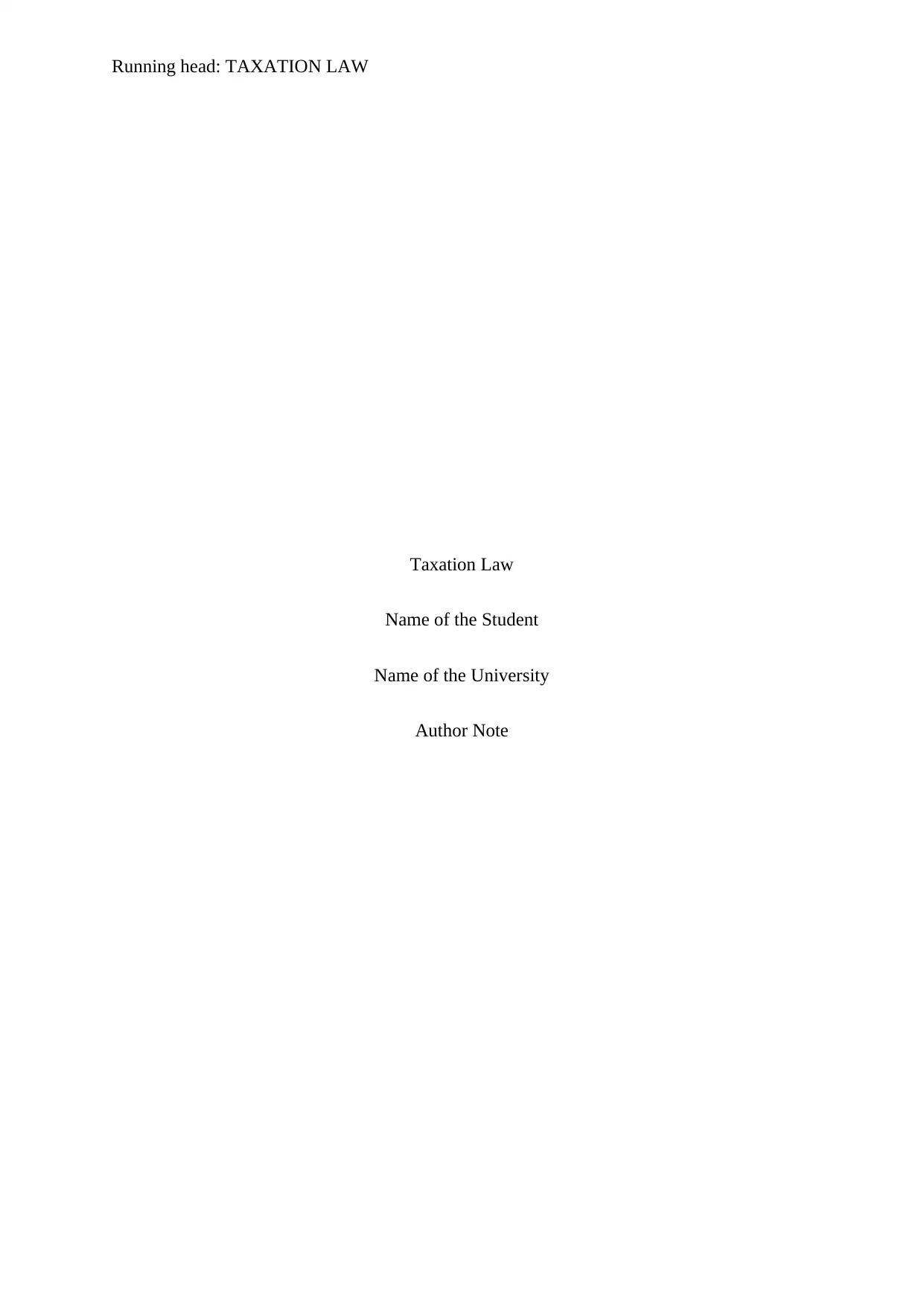
Running head: TAXATION LAW
Taxation Law
Name of the Student
Name of the University
Author Note
Taxation Law
Name of the Student
Name of the University
Author Note
Paraphrase This Document
Need a fresh take? Get an instant paraphrase of this document with our AI Paraphraser
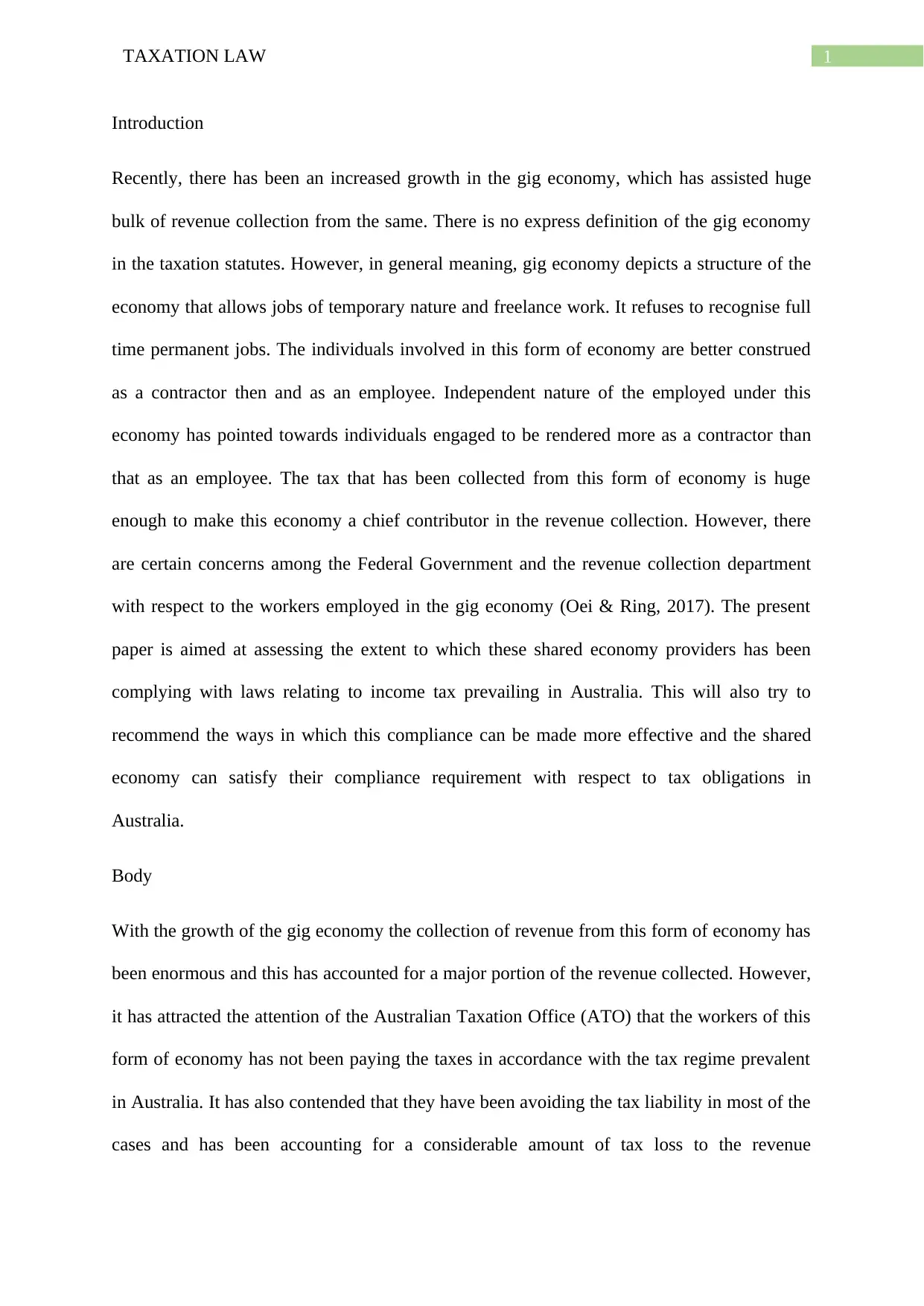
1TAXATION LAW
Introduction
Recently, there has been an increased growth in the gig economy, which has assisted huge
bulk of revenue collection from the same. There is no express definition of the gig economy
in the taxation statutes. However, in general meaning, gig economy depicts a structure of the
economy that allows jobs of temporary nature and freelance work. It refuses to recognise full
time permanent jobs. The individuals involved in this form of economy are better construed
as a contractor then and as an employee. Independent nature of the employed under this
economy has pointed towards individuals engaged to be rendered more as a contractor than
that as an employee. The tax that has been collected from this form of economy is huge
enough to make this economy a chief contributor in the revenue collection. However, there
are certain concerns among the Federal Government and the revenue collection department
with respect to the workers employed in the gig economy (Oei & Ring, 2017). The present
paper is aimed at assessing the extent to which these shared economy providers has been
complying with laws relating to income tax prevailing in Australia. This will also try to
recommend the ways in which this compliance can be made more effective and the shared
economy can satisfy their compliance requirement with respect to tax obligations in
Australia.
Body
With the growth of the gig economy the collection of revenue from this form of economy has
been enormous and this has accounted for a major portion of the revenue collected. However,
it has attracted the attention of the Australian Taxation Office (ATO) that the workers of this
form of economy has not been paying the taxes in accordance with the tax regime prevalent
in Australia. It has also contended that they have been avoiding the tax liability in most of the
cases and has been accounting for a considerable amount of tax loss to the revenue
Introduction
Recently, there has been an increased growth in the gig economy, which has assisted huge
bulk of revenue collection from the same. There is no express definition of the gig economy
in the taxation statutes. However, in general meaning, gig economy depicts a structure of the
economy that allows jobs of temporary nature and freelance work. It refuses to recognise full
time permanent jobs. The individuals involved in this form of economy are better construed
as a contractor then and as an employee. Independent nature of the employed under this
economy has pointed towards individuals engaged to be rendered more as a contractor than
that as an employee. The tax that has been collected from this form of economy is huge
enough to make this economy a chief contributor in the revenue collection. However, there
are certain concerns among the Federal Government and the revenue collection department
with respect to the workers employed in the gig economy (Oei & Ring, 2017). The present
paper is aimed at assessing the extent to which these shared economy providers has been
complying with laws relating to income tax prevailing in Australia. This will also try to
recommend the ways in which this compliance can be made more effective and the shared
economy can satisfy their compliance requirement with respect to tax obligations in
Australia.
Body
With the growth of the gig economy the collection of revenue from this form of economy has
been enormous and this has accounted for a major portion of the revenue collected. However,
it has attracted the attention of the Australian Taxation Office (ATO) that the workers of this
form of economy has not been paying the taxes in accordance with the tax regime prevalent
in Australia. It has also contended that they have been avoiding the tax liability in most of the
cases and has been accounting for a considerable amount of tax loss to the revenue
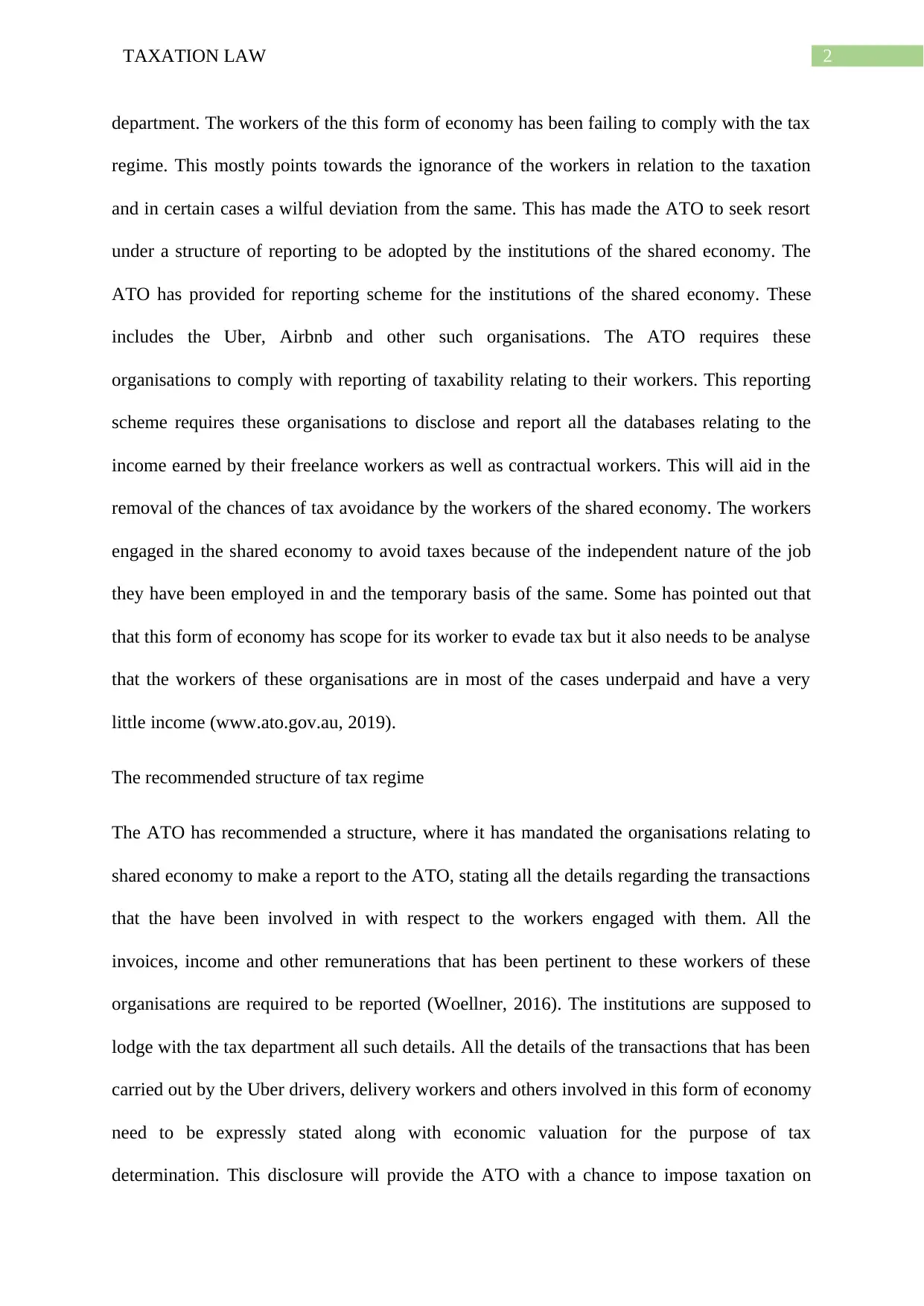
2TAXATION LAW
department. The workers of the this form of economy has been failing to comply with the tax
regime. This mostly points towards the ignorance of the workers in relation to the taxation
and in certain cases a wilful deviation from the same. This has made the ATO to seek resort
under a structure of reporting to be adopted by the institutions of the shared economy. The
ATO has provided for reporting scheme for the institutions of the shared economy. These
includes the Uber, Airbnb and other such organisations. The ATO requires these
organisations to comply with reporting of taxability relating to their workers. This reporting
scheme requires these organisations to disclose and report all the databases relating to the
income earned by their freelance workers as well as contractual workers. This will aid in the
removal of the chances of tax avoidance by the workers of the shared economy. The workers
engaged in the shared economy to avoid taxes because of the independent nature of the job
they have been employed in and the temporary basis of the same. Some has pointed out that
that this form of economy has scope for its worker to evade tax but it also needs to be analyse
that the workers of these organisations are in most of the cases underpaid and have a very
little income (www.ato.gov.au, 2019).
The recommended structure of tax regime
The ATO has recommended a structure, where it has mandated the organisations relating to
shared economy to make a report to the ATO, stating all the details regarding the transactions
that the have been involved in with respect to the workers engaged with them. All the
invoices, income and other remunerations that has been pertinent to these workers of these
organisations are required to be reported (Woellner, 2016). The institutions are supposed to
lodge with the tax department all such details. All the details of the transactions that has been
carried out by the Uber drivers, delivery workers and others involved in this form of economy
need to be expressly stated along with economic valuation for the purpose of tax
determination. This disclosure will provide the ATO with a chance to impose taxation on
department. The workers of the this form of economy has been failing to comply with the tax
regime. This mostly points towards the ignorance of the workers in relation to the taxation
and in certain cases a wilful deviation from the same. This has made the ATO to seek resort
under a structure of reporting to be adopted by the institutions of the shared economy. The
ATO has provided for reporting scheme for the institutions of the shared economy. These
includes the Uber, Airbnb and other such organisations. The ATO requires these
organisations to comply with reporting of taxability relating to their workers. This reporting
scheme requires these organisations to disclose and report all the databases relating to the
income earned by their freelance workers as well as contractual workers. This will aid in the
removal of the chances of tax avoidance by the workers of the shared economy. The workers
engaged in the shared economy to avoid taxes because of the independent nature of the job
they have been employed in and the temporary basis of the same. Some has pointed out that
that this form of economy has scope for its worker to evade tax but it also needs to be analyse
that the workers of these organisations are in most of the cases underpaid and have a very
little income (www.ato.gov.au, 2019).
The recommended structure of tax regime
The ATO has recommended a structure, where it has mandated the organisations relating to
shared economy to make a report to the ATO, stating all the details regarding the transactions
that the have been involved in with respect to the workers engaged with them. All the
invoices, income and other remunerations that has been pertinent to these workers of these
organisations are required to be reported (Woellner, 2016). The institutions are supposed to
lodge with the tax department all such details. All the details of the transactions that has been
carried out by the Uber drivers, delivery workers and others involved in this form of economy
need to be expressly stated along with economic valuation for the purpose of tax
determination. This disclosure will provide the ATO with a chance to impose taxation on
⊘ This is a preview!⊘
Do you want full access?
Subscribe today to unlock all pages.

Trusted by 1+ million students worldwide
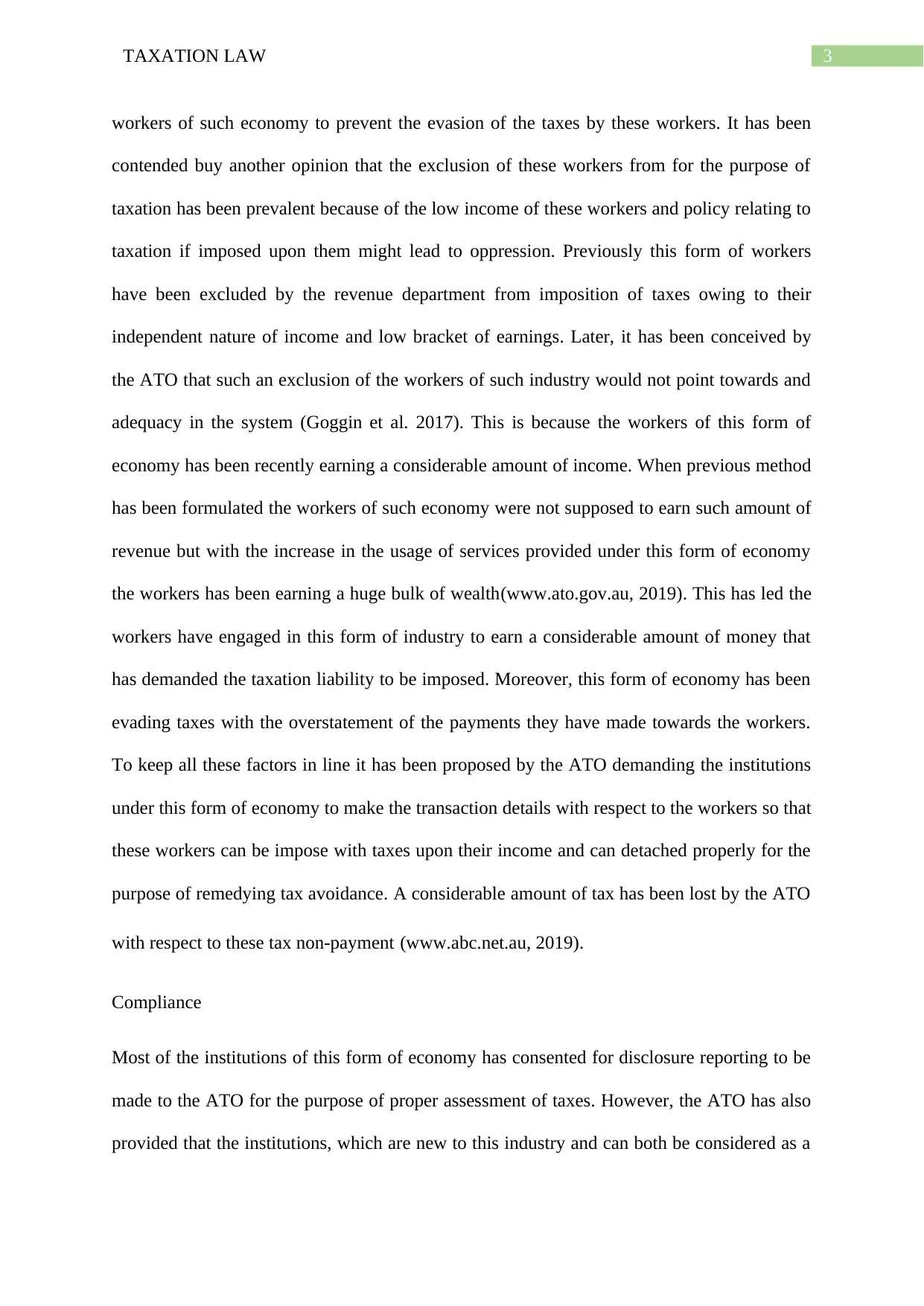
3TAXATION LAW
workers of such economy to prevent the evasion of the taxes by these workers. It has been
contended buy another opinion that the exclusion of these workers from for the purpose of
taxation has been prevalent because of the low income of these workers and policy relating to
taxation if imposed upon them might lead to oppression. Previously this form of workers
have been excluded by the revenue department from imposition of taxes owing to their
independent nature of income and low bracket of earnings. Later, it has been conceived by
the ATO that such an exclusion of the workers of such industry would not point towards and
adequacy in the system (Goggin et al. 2017). This is because the workers of this form of
economy has been recently earning a considerable amount of income. When previous method
has been formulated the workers of such economy were not supposed to earn such amount of
revenue but with the increase in the usage of services provided under this form of economy
the workers has been earning a huge bulk of wealth(www.ato.gov.au, 2019). This has led the
workers have engaged in this form of industry to earn a considerable amount of money that
has demanded the taxation liability to be imposed. Moreover, this form of economy has been
evading taxes with the overstatement of the payments they have made towards the workers.
To keep all these factors in line it has been proposed by the ATO demanding the institutions
under this form of economy to make the transaction details with respect to the workers so that
these workers can be impose with taxes upon their income and can detached properly for the
purpose of remedying tax avoidance. A considerable amount of tax has been lost by the ATO
with respect to these tax non-payment (www.abc.net.au, 2019).
Compliance
Most of the institutions of this form of economy has consented for disclosure reporting to be
made to the ATO for the purpose of proper assessment of taxes. However, the ATO has also
provided that the institutions, which are new to this industry and can both be considered as a
workers of such economy to prevent the evasion of the taxes by these workers. It has been
contended buy another opinion that the exclusion of these workers from for the purpose of
taxation has been prevalent because of the low income of these workers and policy relating to
taxation if imposed upon them might lead to oppression. Previously this form of workers
have been excluded by the revenue department from imposition of taxes owing to their
independent nature of income and low bracket of earnings. Later, it has been conceived by
the ATO that such an exclusion of the workers of such industry would not point towards and
adequacy in the system (Goggin et al. 2017). This is because the workers of this form of
economy has been recently earning a considerable amount of income. When previous method
has been formulated the workers of such economy were not supposed to earn such amount of
revenue but with the increase in the usage of services provided under this form of economy
the workers has been earning a huge bulk of wealth(www.ato.gov.au, 2019). This has led the
workers have engaged in this form of industry to earn a considerable amount of money that
has demanded the taxation liability to be imposed. Moreover, this form of economy has been
evading taxes with the overstatement of the payments they have made towards the workers.
To keep all these factors in line it has been proposed by the ATO demanding the institutions
under this form of economy to make the transaction details with respect to the workers so that
these workers can be impose with taxes upon their income and can detached properly for the
purpose of remedying tax avoidance. A considerable amount of tax has been lost by the ATO
with respect to these tax non-payment (www.abc.net.au, 2019).
Compliance
Most of the institutions of this form of economy has consented for disclosure reporting to be
made to the ATO for the purpose of proper assessment of taxes. However, the ATO has also
provided that the institutions, which are new to this industry and can both be considered as a
Paraphrase This Document
Need a fresh take? Get an instant paraphrase of this document with our AI Paraphraser
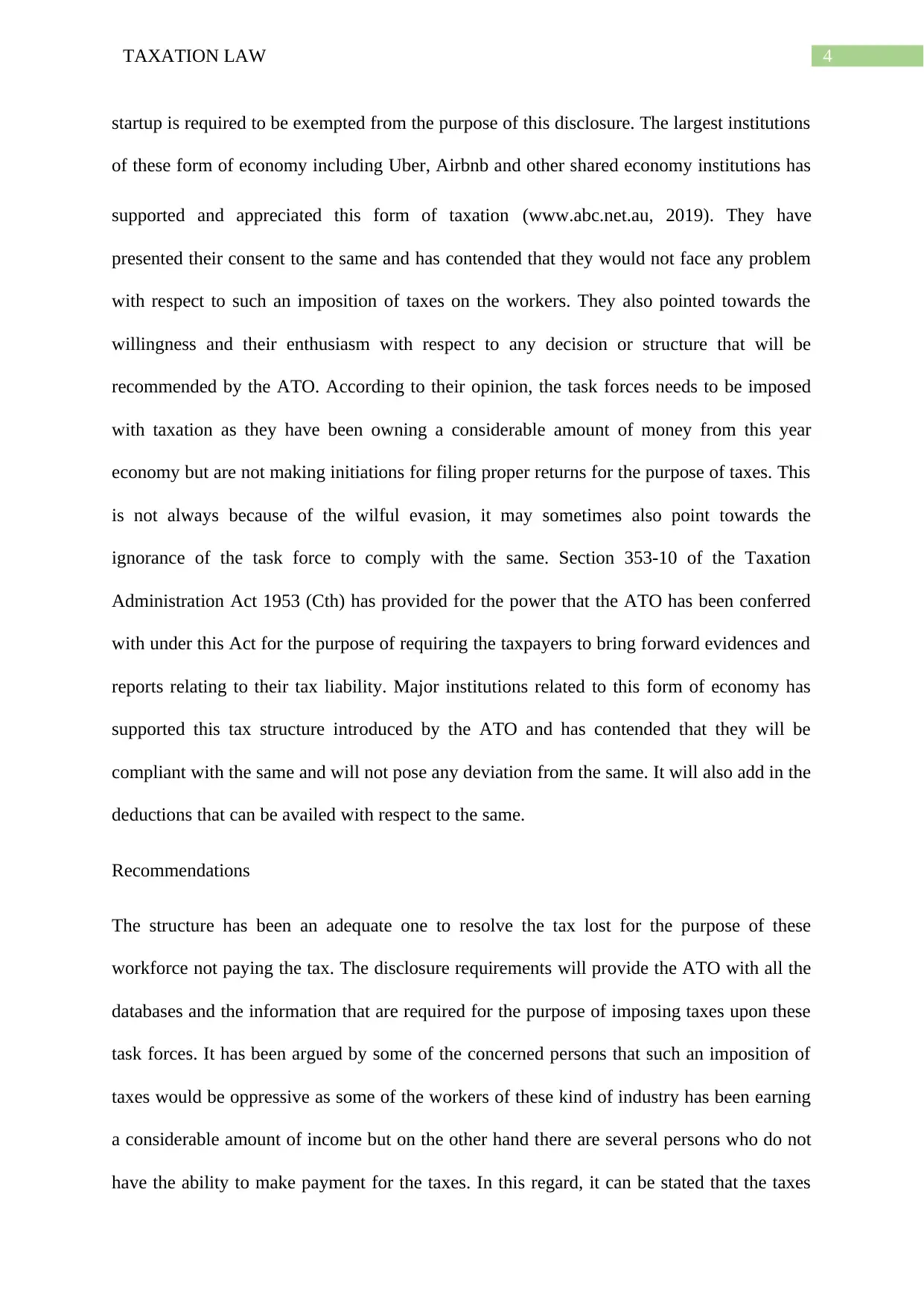
4TAXATION LAW
startup is required to be exempted from the purpose of this disclosure. The largest institutions
of these form of economy including Uber, Airbnb and other shared economy institutions has
supported and appreciated this form of taxation (www.abc.net.au, 2019). They have
presented their consent to the same and has contended that they would not face any problem
with respect to such an imposition of taxes on the workers. They also pointed towards the
willingness and their enthusiasm with respect to any decision or structure that will be
recommended by the ATO. According to their opinion, the task forces needs to be imposed
with taxation as they have been owning a considerable amount of money from this year
economy but are not making initiations for filing proper returns for the purpose of taxes. This
is not always because of the wilful evasion, it may sometimes also point towards the
ignorance of the task force to comply with the same. Section 353-10 of the Taxation
Administration Act 1953 (Cth) has provided for the power that the ATO has been conferred
with under this Act for the purpose of requiring the taxpayers to bring forward evidences and
reports relating to their tax liability. Major institutions related to this form of economy has
supported this tax structure introduced by the ATO and has contended that they will be
compliant with the same and will not pose any deviation from the same. It will also add in the
deductions that can be availed with respect to the same.
Recommendations
The structure has been an adequate one to resolve the tax lost for the purpose of these
workforce not paying the tax. The disclosure requirements will provide the ATO with all the
databases and the information that are required for the purpose of imposing taxes upon these
task forces. It has been argued by some of the concerned persons that such an imposition of
taxes would be oppressive as some of the workers of these kind of industry has been earning
a considerable amount of income but on the other hand there are several persons who do not
have the ability to make payment for the taxes. In this regard, it can be stated that the taxes
startup is required to be exempted from the purpose of this disclosure. The largest institutions
of these form of economy including Uber, Airbnb and other shared economy institutions has
supported and appreciated this form of taxation (www.abc.net.au, 2019). They have
presented their consent to the same and has contended that they would not face any problem
with respect to such an imposition of taxes on the workers. They also pointed towards the
willingness and their enthusiasm with respect to any decision or structure that will be
recommended by the ATO. According to their opinion, the task forces needs to be imposed
with taxation as they have been owning a considerable amount of money from this year
economy but are not making initiations for filing proper returns for the purpose of taxes. This
is not always because of the wilful evasion, it may sometimes also point towards the
ignorance of the task force to comply with the same. Section 353-10 of the Taxation
Administration Act 1953 (Cth) has provided for the power that the ATO has been conferred
with under this Act for the purpose of requiring the taxpayers to bring forward evidences and
reports relating to their tax liability. Major institutions related to this form of economy has
supported this tax structure introduced by the ATO and has contended that they will be
compliant with the same and will not pose any deviation from the same. It will also add in the
deductions that can be availed with respect to the same.
Recommendations
The structure has been an adequate one to resolve the tax lost for the purpose of these
workforce not paying the tax. The disclosure requirements will provide the ATO with all the
databases and the information that are required for the purpose of imposing taxes upon these
task forces. It has been argued by some of the concerned persons that such an imposition of
taxes would be oppressive as some of the workers of these kind of industry has been earning
a considerable amount of income but on the other hand there are several persons who do not
have the ability to make payment for the taxes. In this regard, it can be stated that the taxes
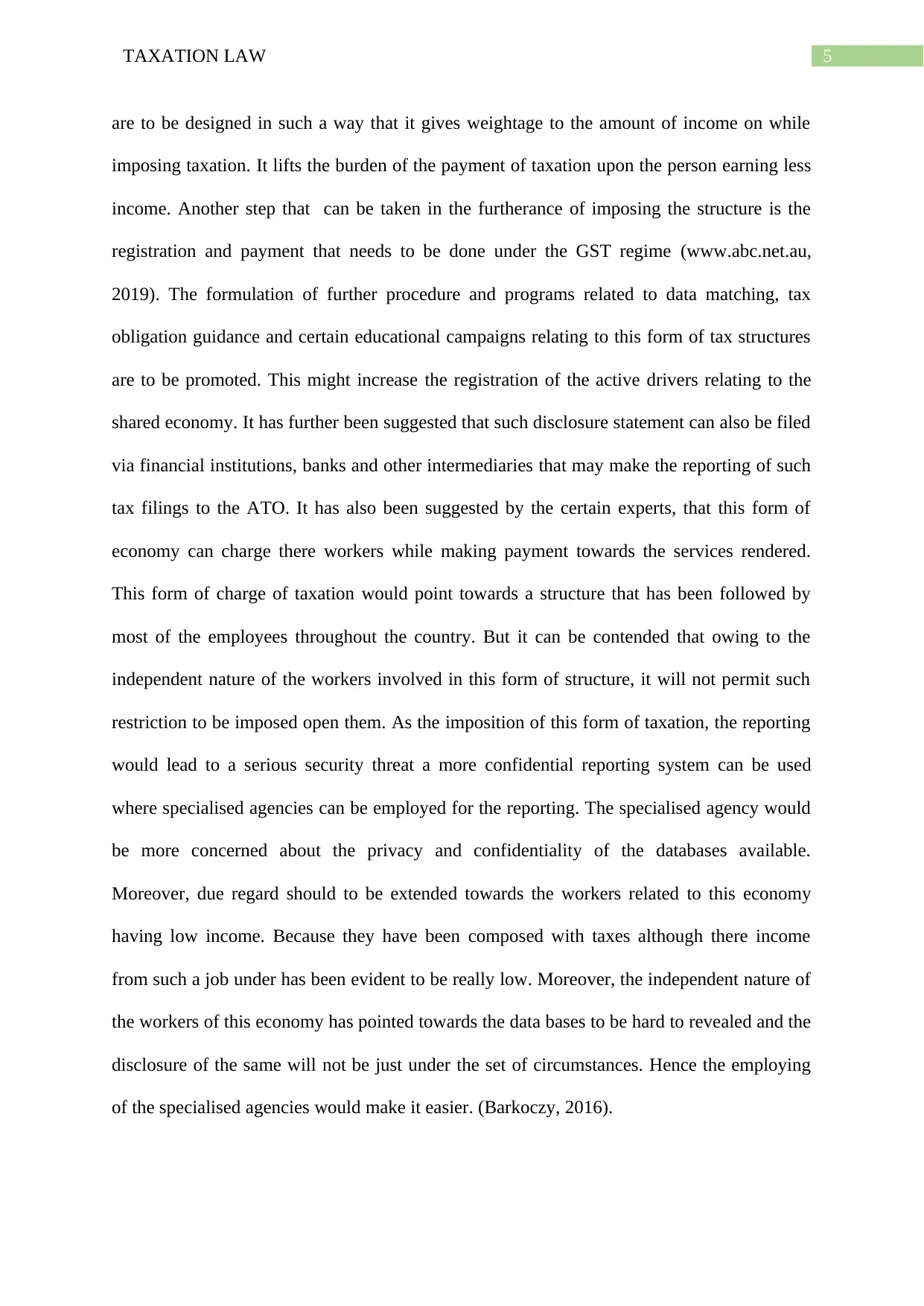
5TAXATION LAW
are to be designed in such a way that it gives weightage to the amount of income on while
imposing taxation. It lifts the burden of the payment of taxation upon the person earning less
income. Another step that can be taken in the furtherance of imposing the structure is the
registration and payment that needs to be done under the GST regime (www.abc.net.au,
2019). The formulation of further procedure and programs related to data matching, tax
obligation guidance and certain educational campaigns relating to this form of tax structures
are to be promoted. This might increase the registration of the active drivers relating to the
shared economy. It has further been suggested that such disclosure statement can also be filed
via financial institutions, banks and other intermediaries that may make the reporting of such
tax filings to the ATO. It has also been suggested by the certain experts, that this form of
economy can charge there workers while making payment towards the services rendered.
This form of charge of taxation would point towards a structure that has been followed by
most of the employees throughout the country. But it can be contended that owing to the
independent nature of the workers involved in this form of structure, it will not permit such
restriction to be imposed open them. As the imposition of this form of taxation, the reporting
would lead to a serious security threat a more confidential reporting system can be used
where specialised agencies can be employed for the reporting. The specialised agency would
be more concerned about the privacy and confidentiality of the databases available.
Moreover, due regard should to be extended towards the workers related to this economy
having low income. Because they have been composed with taxes although there income
from such a job under has been evident to be really low. Moreover, the independent nature of
the workers of this economy has pointed towards the data bases to be hard to revealed and the
disclosure of the same will not be just under the set of circumstances. Hence the employing
of the specialised agencies would make it easier. (Barkoczy, 2016).
are to be designed in such a way that it gives weightage to the amount of income on while
imposing taxation. It lifts the burden of the payment of taxation upon the person earning less
income. Another step that can be taken in the furtherance of imposing the structure is the
registration and payment that needs to be done under the GST regime (www.abc.net.au,
2019). The formulation of further procedure and programs related to data matching, tax
obligation guidance and certain educational campaigns relating to this form of tax structures
are to be promoted. This might increase the registration of the active drivers relating to the
shared economy. It has further been suggested that such disclosure statement can also be filed
via financial institutions, banks and other intermediaries that may make the reporting of such
tax filings to the ATO. It has also been suggested by the certain experts, that this form of
economy can charge there workers while making payment towards the services rendered.
This form of charge of taxation would point towards a structure that has been followed by
most of the employees throughout the country. But it can be contended that owing to the
independent nature of the workers involved in this form of structure, it will not permit such
restriction to be imposed open them. As the imposition of this form of taxation, the reporting
would lead to a serious security threat a more confidential reporting system can be used
where specialised agencies can be employed for the reporting. The specialised agency would
be more concerned about the privacy and confidentiality of the databases available.
Moreover, due regard should to be extended towards the workers related to this economy
having low income. Because they have been composed with taxes although there income
from such a job under has been evident to be really low. Moreover, the independent nature of
the workers of this economy has pointed towards the data bases to be hard to revealed and the
disclosure of the same will not be just under the set of circumstances. Hence the employing
of the specialised agencies would make it easier. (Barkoczy, 2016).
⊘ This is a preview!⊘
Do you want full access?
Subscribe today to unlock all pages.

Trusted by 1+ million students worldwide
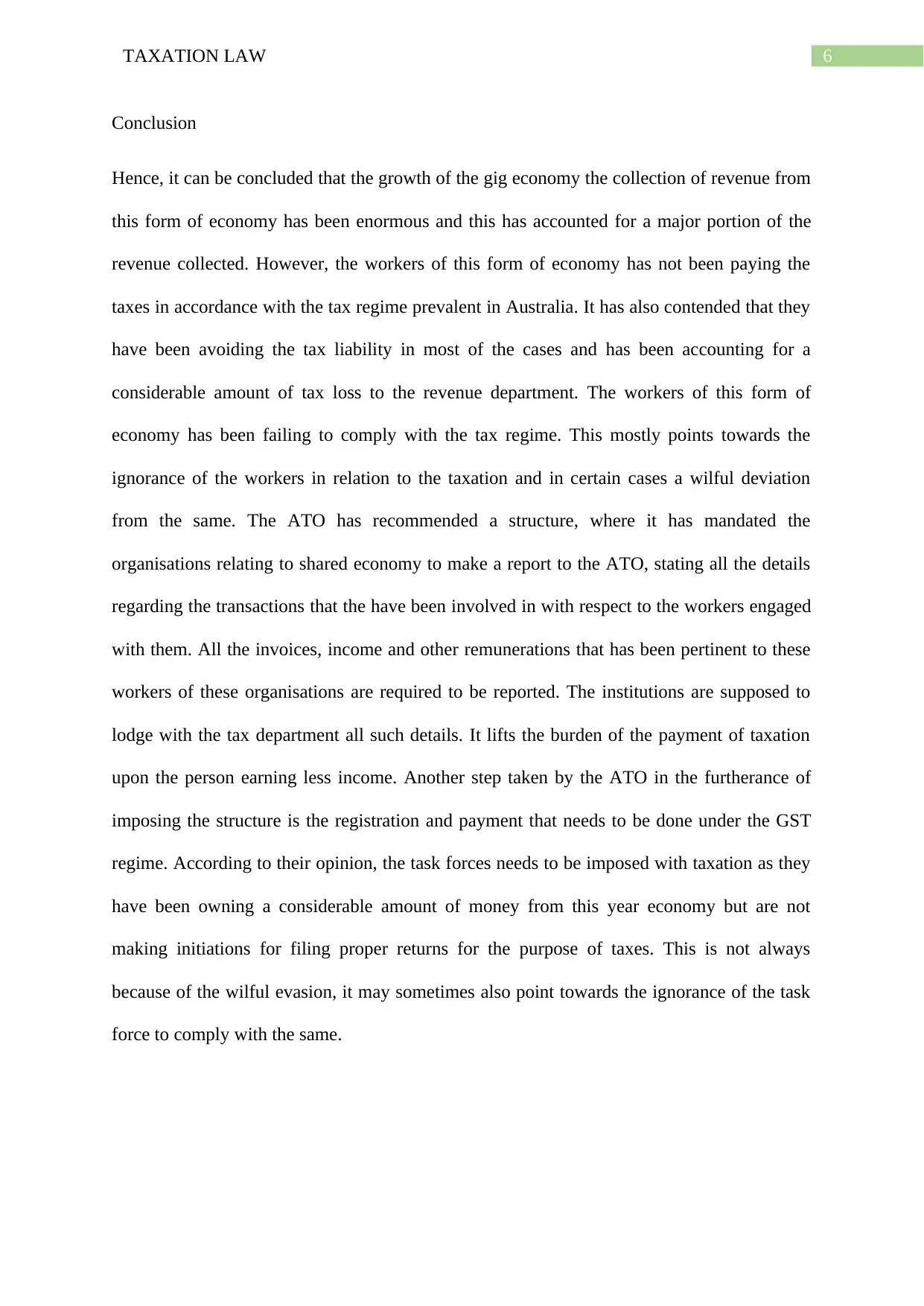
6TAXATION LAW
Conclusion
Hence, it can be concluded that the growth of the gig economy the collection of revenue from
this form of economy has been enormous and this has accounted for a major portion of the
revenue collected. However, the workers of this form of economy has not been paying the
taxes in accordance with the tax regime prevalent in Australia. It has also contended that they
have been avoiding the tax liability in most of the cases and has been accounting for a
considerable amount of tax loss to the revenue department. The workers of this form of
economy has been failing to comply with the tax regime. This mostly points towards the
ignorance of the workers in relation to the taxation and in certain cases a wilful deviation
from the same. The ATO has recommended a structure, where it has mandated the
organisations relating to shared economy to make a report to the ATO, stating all the details
regarding the transactions that the have been involved in with respect to the workers engaged
with them. All the invoices, income and other remunerations that has been pertinent to these
workers of these organisations are required to be reported. The institutions are supposed to
lodge with the tax department all such details. It lifts the burden of the payment of taxation
upon the person earning less income. Another step taken by the ATO in the furtherance of
imposing the structure is the registration and payment that needs to be done under the GST
regime. According to their opinion, the task forces needs to be imposed with taxation as they
have been owning a considerable amount of money from this year economy but are not
making initiations for filing proper returns for the purpose of taxes. This is not always
because of the wilful evasion, it may sometimes also point towards the ignorance of the task
force to comply with the same.
Conclusion
Hence, it can be concluded that the growth of the gig economy the collection of revenue from
this form of economy has been enormous and this has accounted for a major portion of the
revenue collected. However, the workers of this form of economy has not been paying the
taxes in accordance with the tax regime prevalent in Australia. It has also contended that they
have been avoiding the tax liability in most of the cases and has been accounting for a
considerable amount of tax loss to the revenue department. The workers of this form of
economy has been failing to comply with the tax regime. This mostly points towards the
ignorance of the workers in relation to the taxation and in certain cases a wilful deviation
from the same. The ATO has recommended a structure, where it has mandated the
organisations relating to shared economy to make a report to the ATO, stating all the details
regarding the transactions that the have been involved in with respect to the workers engaged
with them. All the invoices, income and other remunerations that has been pertinent to these
workers of these organisations are required to be reported. The institutions are supposed to
lodge with the tax department all such details. It lifts the burden of the payment of taxation
upon the person earning less income. Another step taken by the ATO in the furtherance of
imposing the structure is the registration and payment that needs to be done under the GST
regime. According to their opinion, the task forces needs to be imposed with taxation as they
have been owning a considerable amount of money from this year economy but are not
making initiations for filing proper returns for the purpose of taxes. This is not always
because of the wilful evasion, it may sometimes also point towards the ignorance of the task
force to comply with the same.
Paraphrase This Document
Need a fresh take? Get an instant paraphrase of this document with our AI Paraphraser
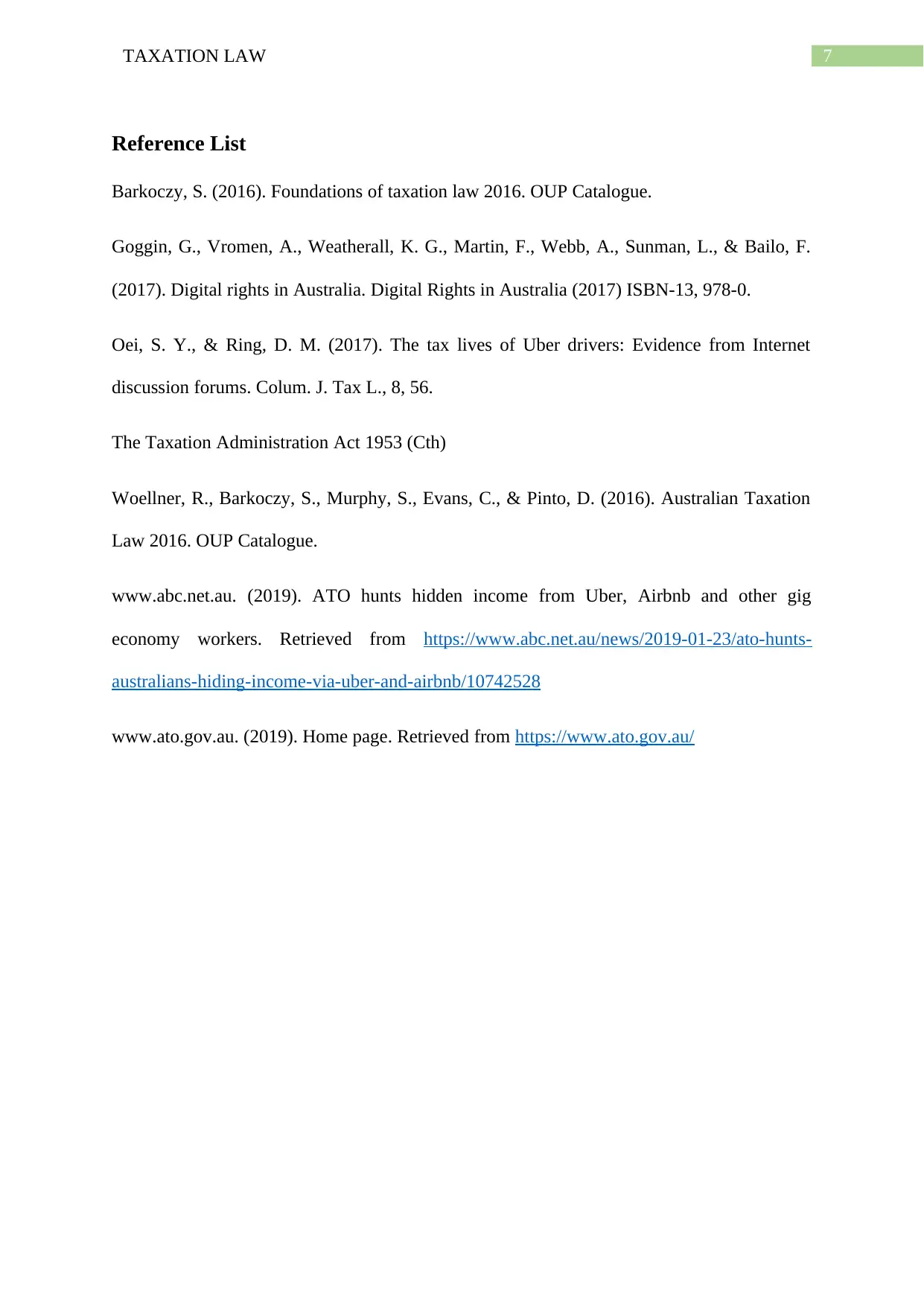
7TAXATION LAW
Reference List
Barkoczy, S. (2016). Foundations of taxation law 2016. OUP Catalogue.
Goggin, G., Vromen, A., Weatherall, K. G., Martin, F., Webb, A., Sunman, L., & Bailo, F.
(2017). Digital rights in Australia. Digital Rights in Australia (2017) ISBN-13, 978-0.
Oei, S. Y., & Ring, D. M. (2017). The tax lives of Uber drivers: Evidence from Internet
discussion forums. Colum. J. Tax L., 8, 56.
The Taxation Administration Act 1953 (Cth)
Woellner, R., Barkoczy, S., Murphy, S., Evans, C., & Pinto, D. (2016). Australian Taxation
Law 2016. OUP Catalogue.
www.abc.net.au. (2019). ATO hunts hidden income from Uber, Airbnb and other gig
economy workers. Retrieved from https://www.abc.net.au/news/2019-01-23/ato-hunts-
australians-hiding-income-via-uber-and-airbnb/10742528
www.ato.gov.au. (2019). Home page. Retrieved from https://www.ato.gov.au/
Reference List
Barkoczy, S. (2016). Foundations of taxation law 2016. OUP Catalogue.
Goggin, G., Vromen, A., Weatherall, K. G., Martin, F., Webb, A., Sunman, L., & Bailo, F.
(2017). Digital rights in Australia. Digital Rights in Australia (2017) ISBN-13, 978-0.
Oei, S. Y., & Ring, D. M. (2017). The tax lives of Uber drivers: Evidence from Internet
discussion forums. Colum. J. Tax L., 8, 56.
The Taxation Administration Act 1953 (Cth)
Woellner, R., Barkoczy, S., Murphy, S., Evans, C., & Pinto, D. (2016). Australian Taxation
Law 2016. OUP Catalogue.
www.abc.net.au. (2019). ATO hunts hidden income from Uber, Airbnb and other gig
economy workers. Retrieved from https://www.abc.net.au/news/2019-01-23/ato-hunts-
australians-hiding-income-via-uber-and-airbnb/10742528
www.ato.gov.au. (2019). Home page. Retrieved from https://www.ato.gov.au/
1 out of 8
Related Documents
Your All-in-One AI-Powered Toolkit for Academic Success.
+13062052269
info@desklib.com
Available 24*7 on WhatsApp / Email
![[object Object]](/_next/static/media/star-bottom.7253800d.svg)
Unlock your academic potential
Copyright © 2020–2026 A2Z Services. All Rights Reserved. Developed and managed by ZUCOL.





